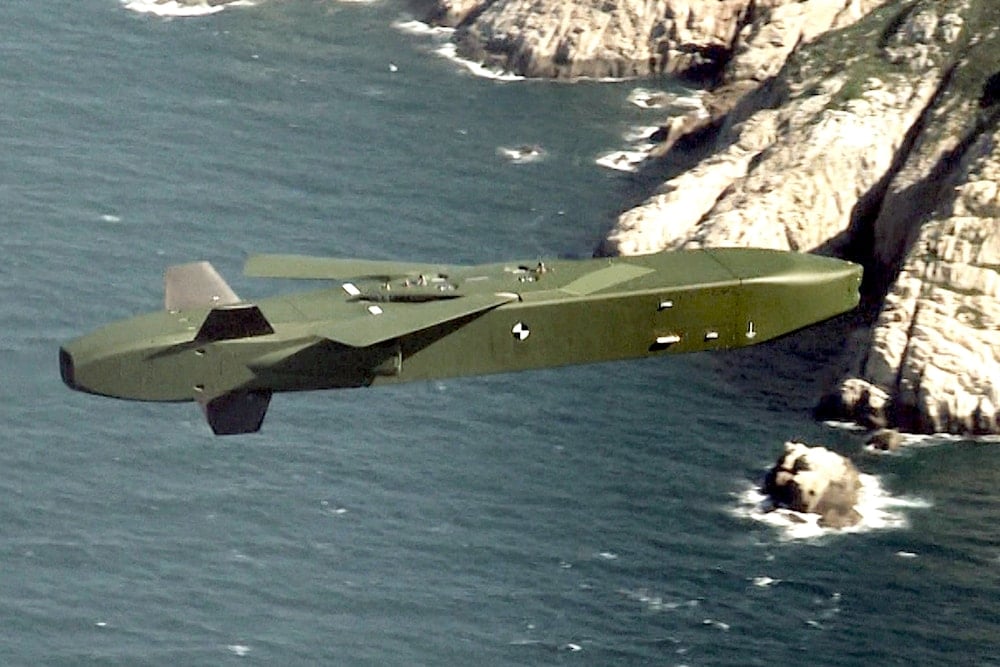Germany open to sending Taurus missiles to Ukraine: Merz
German Chancellor front-runner Merz says that providing Ukraine with Germany's Taurus long-range missiles is possible, in coordination with other European countries.
-

A Taurus missile flies during a drill off the country's western coast in South Korea, Wednesday, Sept. 13, 2017 (AP)
Germany is prepared to provide Ukraine with long-range missiles, according to the country’s chancellor-in-waiting, who emphasized the importance of strengthening Kiev’s position to push for concessions from Russian President Vladimir Putin.
When questioned whether he would act on his earlier push for Germany to deliver Taurus missiles—long requested by Ukraine— Friedrich Merz stated that he would support such a move if coordinated with European allies, stating, “Our European partners are already supplying cruise missiles,” during an interview with public broadcaster ARD.
With a range exceeding 500 kilometers, the Taurus missile system, developed jointly by European defense firm MBDA and Sweden's Saab, outranges Britain's and France's Storm Shadows as well as America's ATACMS, potentially enabling Ukrainian forces to hit targets far behind enemy lines.
Merz emphasized that “The British are doing it, the French are doing it, and the Americans are doing it anyway," adding, “This must be jointly agreed. And if it agreed, then Germany should take part.”
Referring to US President Donald Trump's attempts to arrive at a peace agreement between Russia and Ukraine, Merz cautioned that Putin would not "respond positively to weakness and peace offers," while pointing to the attack on Sumy—which reportedly killed at least 34 civilians and wounded 117—as evidence of how Putin treats those who propose ceasefires.
Scholz refuses to provide Ukraine with Taurus
Despite persistent requests from Kiev and its allies, Germany's outgoing Chancellor Olaf Scholz has consistently refused to provide Ukraine with Taurus missiles, highlighting that supplying Kiev with such a weapon would carry "a great risk of escalation" in the Russian-Ukrainian conflict.
Merz, whose center-right Christian Democrats (CDU) won February's federal election, condemned Scholz's position by demanding last October that he issue Putin an ultimatum, threatening to supply Taurus missiles within 24 hours unless Russia stopped attacking Ukrainian civilian infrastructure.
During the election campaign, Merz softened his earlier stance as Scholz positioned himself as a "chancellor of peace" aiming to shield Germany from direct involvement in the Ukraine war, while also facing rising support for the far-right AfD party, which advocates for improved relations with Moscow.
It's unclear if Merz's SPD coalition partners would approve Taurus missile transfers, as despite SPD co-leader Klingbeil's pro-Ukraine stance, significant wariness persists within the party, particularly among SPD lawmakers and members preparing to vote on the coalition agreement.
Merz' announcement comes amid intensified support by European countries for Ukraine, as Trump continues to push for a ceasefire deal between the two countries.
European nations race to aid Ukraine
The UK pledged £450 million more in military aid on April 11 as it and Germany prepare to host 50 allies in Brussels, with Defense Secretary John Healey saying the meeting aims to ramp up pressure on Putin and boost Ukraine's defenses against Russian aggression.
Including funds for drones, anti-tank mines, and vehicle maintenance, the aid package involves £350 million from the UK directly, supplemented by Norwegian contributions through the UK-managed International Fund for Ukraine.
Earlier on April 9, the EU transferred €1 billion to Ukraine under the ERA (Extraordinary Revenue Acceleration) program, marking the third such payment under the G7 scheme funded by profits from frozen Russian assets, with the prime minister stating on Telegram that these funds will cover critical budget needs.
The European Council's March 20 summit conclusions stated that EU member states will provide military assistance to Ukraine on a voluntary basis, with all support and security guarantees being delivered in full accordance with each nation's defense policies while considering the collective security interests of all member states.

 4 Min Read
4 Min Read










